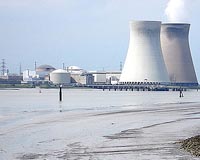 |
Sydney (AFP) Oct 14, 2009 Australia has asked India to take part in joint military exercises but is standing firm against exporting uranium for the Asian country's nuclear energy programme, Foreign Minister Stephen Smith said. Speaking in New Delhi on Tuesday, Smith said Australia wanted to strengthen security cooperation with India and was ready to place it in the "front rank of our bilateral relationships". But he repeated his government's position that it would not sell uranium to the Asian giant, which is energy-starved but nuclear-armed, unless it signs a key non-proliferation pact. Smith said he and Indian counterpart S.M. Krishna had talked about uranium but that Australia had no plans to revive a landmark deal negotiated by the former government to sell the ore to India. "We have had a long-standing principal position which is not aimed at India, it is the long-standing position that we do not export uranium to a country that is not a party to the Nuclear Non-Proliferation Treaty," he said. Smith said Australia had supported New Delhi in its successful bid to have a 34-year-old embargo on the export and sale of nuclear technology to India lifted and that this was "probably more important to India". The minister said that as India's global influence increased, it became more important to strengthen regional ties. "I invited India, through the External Affairs Minister Krishna, to take part in some of the multilateral military exercises that Australia has," he told Indian media, according to a transcript released by the foreign ministry. "This is not only a sensible regional thing to do but it is also a confidence-building measure." Australia boasts the world's largest reserves of uranium, which is used as nuclear fuel, but has no nuclear power industry and only operates three mines producing partially-refined uranium ore known as yellowcake. Smith, who has faced suggestions that China has pressed Australia not to supply its regional rival India with uranium, said the government disliked the idea that Canberra favoured one country over the other. He said Canberra's relationships with China and India were both important but "necessarily different". "We have a long-standing economic relationship with China," he said. "It is also true to say that in recent times our relationship with China has not been free from difficulty. There are clear differences between the Australian system and the Chinese system." Diplomatic tensions between Australia and China flared earlier this year after the arrest of an executive with Anglo-Australian mining company Rio Tinto. Share This Article With Planet Earth
Related Links Nuclear Power News - Nuclear Science, Nuclear Technology Powering The World in the 21st Century at Energy-Daily.com
 Belgium extends lifetime of its reactors
Belgium extends lifetime of its reactorsBrussels (UPI) Oct 13, 2009 Belgium has decided to keep its nuclear power plants running for another decade, in a further sign that a nuclear revival is taking place in Europe. Energy and Climate Minister Paul Magnette said Monday that the government had decided to delay the nuclear phase-out that was scheduled to start in 2015. "The government has decided to delay by 10 years the first stage of phasing ... read more |
|
| The content herein, unless otherwise known to be public domain, are Copyright 1995-2009 - SpaceDaily. AFP and UPI Wire Stories are copyright Agence France-Presse and United Press International. ESA Portal Reports are copyright European Space Agency. All NASA sourced material is public domain. Additional copyrights may apply in whole or part to other bona fide parties. Advertising does not imply endorsement,agreement or approval of any opinions, statements or information provided by SpaceDaily on any Web page published or hosted by SpaceDaily. Privacy Statement |